#Homeopathy Specialist in Indirapuram
Text
*Dr. Smita Goel Homeopathy Clinic*
www.thehomeopathyclinic.co.in
Our immune system is our body’s defense against infections and other harmful invaders. Without it, we would constantly get sick from bacteria or viruses.
Our immune system is made up of special cells, tissues, and organs that work together to protect us.
Normally, the immune system can tell the difference between foreign cells and our own cells.
In an autoimmune disease, the immune system mistakes part of our body, like our joints or skin, as foreign. It releases proteins called autoantibodies that attack healthy cells.
Some autoimmune diseases target only one organ. Type 1 diabetes damages the pancreas. Other diseases, like Systemic Lupus Erythematosus (SLE), affect the whole body..
Women get autoimmune diseases rate is high compared to men. Often the disease starts during a woman’s childbearing years (15Years to 44Years).
Certain autoimmune diseases, like multiple sclerosis and lupus, run in families. Not every family member will necessarily have the same disease, but they inherit a susceptibility to an autoimmune condition.
Because the incidence of autoimmune diseases is rising, researchers suspect environmental factors like infections and exposure to chemicals or solvents might also be involved. Our modern life style, working style and foods are also huge causes.
We don’t know exactly what causes autoimmune diseases. Genetics, diet, infections, and exposure to chemicals might be involved.
The lymph or lymphatic, system is a major part of the immune system. It's a network of lymph nodes and vessels. Lymphatic vessels are thin tubes that branch, like blood vessels, throughout the body. They carry a clear fluid called lymph. Lymph contains tissue fluid, waste products, and immune system cells. Lymph nodes are small, bean-shaped clumps of immune system cells that are connected by lymphatic vessels. They contain white blood cells that trap viruses, bacteria, and other invaders, including cancer cells.
White blood cells are the cells of the immune system. They are made in one of your lymph organs, the bone marrow. Other lymph organs include the spleen and thymus.
When our immune system doesn't work the way it should, it is called an immune system disorder.
• Primary immune deficiency – Be born with a weak immune system.
• Acquired immune deficiency – Get a disease that weakens your immune system.
• Allergic reaction – Have an immune system that is too active.
• Autoimmune disease – Have an immune system that turns against you.
There are some common examples:
• Severe combined immunodeficiency (SCID) is an example of an immune deficiency that is present at birth. Children are in constant danger of infections from bacteria, viruses, and fungi. This disorder is sometimes called “bubble boy disease.”
• Temporary acquired immune deficiencies. Our immune system can be weakened by certain medicines, for example: This can happen to people on chemotherapy or other drugs used to treat cancer. It can also happen to people following organ transplants who take medicine to prevent organ rejection. Also, infections like the flu virus, mono (mononucleosis), and measles can weaken the immune system for a brief time. Our immune system can also be weakened by smoking, alcohol, and poor nutrition.
• AIDS. HIV, which causes AIDS, is an acquired viral infection that destroys important white blood cells and weakens the immune system. People with HIV/AIDS become seriously ill with infections that most people can fight off. These infections are called “opportunistic infections” because they take advantage of weak immune systems.
If we are born with certain genes, our immune system may react to substances in the environment that are normally harmless. These substances are called allergens. Having an allergic reaction is the most common example of an overactive immune system. Dust, mold, pollen, and foods are examples of allergens.
Some conditions caused by an overactive immune system are:
• Asthma: The response in our lungs can cause coughing, wheezing, and trouble breathing. Asthma can be triggered by common allergens like dust or pollen or by an irritant like tobacco smoke.
• Eczema: An allergen causes an itchy rash known as atopic dermatitis.
• Allergic rhinitis: Sneezing, a runny nose, sniffling, and swelling of your nasal passages from indoor allergens like dust and pets or outdoor allergens like pollens or molds.
In autoimmune diseases, the body attacks normal, healthy tissues. The causes are unknown. It is probably a combination of a person’s genes and something in the environment that triggers those genes.
There are some common autoimmune diseases are:
• Type 1 diabetes: The immune system attacks the cells in the pancreas that make insulin. Insulin removes sugar from the blood to use as energy.
• Rheumatoid arthritis: This type of arthritis causes swelling and deformities of the joints. An auto-antibody called rheumatoid factor is in the blood of some people with rheumatoid arthritis.
• Lupus: This disease that attacks body tissues, including the lungs, kidneys, and skin. Many types of auto-antibodies are found in the blood of people with lupus.
So, we should never ignore to our care for immunity system. Homeopathy medicines are a good choice for improving our immunity system.
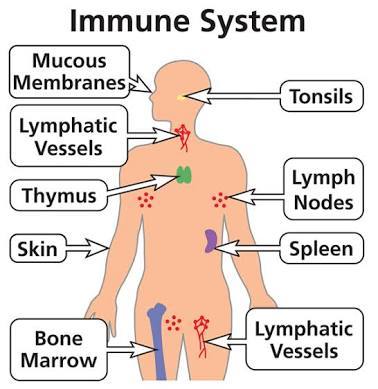
#greater noida#best homeo clinic in indirapuram#ghaziabad#homeopathy clinics#homeopathy doctor#homeopathy for ibs#best skin doctor in ghaziabad#homeopathy#homeopathy cold treatment in indirapuram#homeopathy medicine#laser treatment in indirapuram#skin specialist in indirapuram#homeopathy skin allergies treatment in indirapuram#homeopathy specialist in indirapuram#indirapuram#best homeopathy clinic in indirapuram#best homeopathy doctor#homeopathy skin allergies treatment in noida#homeopathy treatment#homoeopathy#ghaziabad latest news#best schools in ghaziabad#ghaziabadnews#ayurvedic doctor in ghaziabad#wave city ghaziabad#child doctor in noida#child specialist in noida#noida news#nursery school in greater noida#noida
3 notes
·
View notes
Text
LASER HAIR REMOVAL
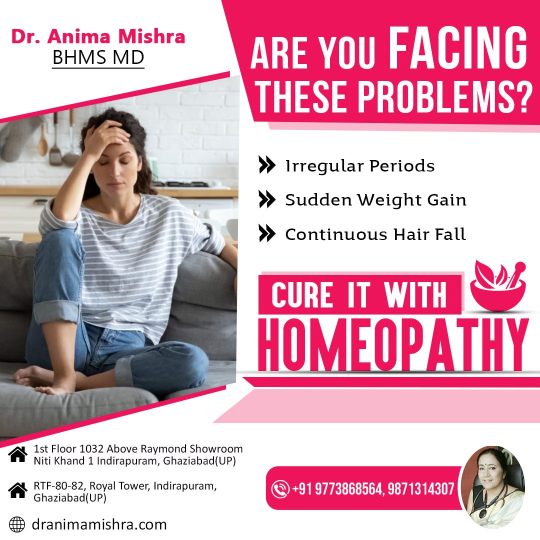
Laser hair removal treatment is better than anything. The most effective way to eliminate unwanted facial hair as in the nose or on the chin is with a laser.
#Best Homeopathy Clinic in Indirapuram#Homeopathy Specialist in Indirapuram#Cryolipolysis Clinic in Indirapuram#Tattoo Removal in Indirapuram#Anti Aging Treatment in Indirapauram#Training center for Makeup courses in indirapuram#Training center for beauty courses in indirapuram#Hair Removal Clinic in Indirapuram#Weight Loss Clinic in Indirapauram#Laser Treatment in Indirapuram#Laser Hair Removal in Indirapuram#Hair Loss Treatment in Indirapuram#Best Dermatologist in Indirapuram#Skin Specialist in Indirapuram#Best Skin Specialist in Indirapuram#Weight Loss Clinic in Indirapuram
2 notes
·
View notes
Text
Dr. Anima Mishra, Best Dermatologist in Indirapuram

Best Dermatologist in Indirapuram, finding the right dermatologist can be a daunting task. Your skin deserves the best care, and that's where Dr. Anima Mishra, the renowned dermatologist, comes into play. With a reputation for excellence and a commitment to helping you achieve flawless skin, Dr. Mishra has become the go-to choice for residents seeking top-notch dermatological services in the area. In this article, we will explore why Dr. Anima Mishra is considered the best dermatologist in Indirapuram and how her expertise can transform your skin.
1. Best Dermatologist in Indirapuram
Dr. Anima Mishra's journey towards becoming the best dermatologist in Indirapuram is marked by her exceptional qualifications and extensive expertise. She holds a medical degree from a prestigious institution and has undergone rigorous training in dermatology. Her commitment to staying updated with the latest advancements in dermatological science is unwavering, ensuring that her patients receive the best possible care.
Dr. Mishra specializes in a wide range of dermatological services, including but not limited to acne treatment, anti-aging procedures, skin rejuvenation, and advanced hair restoration techniques. Her expertise extends to diagnosing and treating complex skin conditions, making her a trusted resource for individuals seeking solutions to their skin woes.
2. Personalized Approach to Skin Care:
What sets Dr. Anima Mishra apart from other dermatologists in Indirapuram is her personalized approach to skin care. She understands that each patient's skin is unique and requires customized treatments. Dr. Mishra takes the time to listen to her patients, thoroughly assess their skin concerns, and develop tailored treatment plans that address their specific needs.
Whether you're struggling with persistent acne, uneven skin tone, or signs of aging, Dr. Mishra's expertise enables her to recommend the most effective treatments. Her holistic approach focuses not only on treating existing skin issues but also on preventing future problems, helping patients achieve long-lasting results.
3. State-of-the-Art Technology:
Dr. Anima Mishra's commitment to excellence is reflected in her clinic's state-of-the-art technology and modern facilities. She employs cutting-edge equipment and techniques to ensure that her patients receive the highest standard of care.
Her clinic offers a range of advanced treatments, including laser therapy, chemical peels, dermal fillers, and more. These technologies enable her to deliver remarkable results with minimal discomfort and downtime. Dr. Mishra's clinic adheres to strict safety protocols, ensuring that every patient's experience is safe and comfortable.
4. Positive Patient Experiences:
Dr. Anima Mishra's reputation as the best dermatologist in Indirapuram is not just based on her qualifications and expertise but also on the positive experiences of her patients. Numerous individuals have entrusted their skin care to her, and their glowing testimonials speak volumes about her dedication to excellence.
Patients appreciate Dr. Mishra's compassionate and friendly demeanor, which makes them feel comfortable and cared for during their visits. Her attention to detail and commitment to achieving optimal results have earned her the trust and gratitude of countless individuals who have witnessed transformative changes in their skin under her care.
Conclusion
In the vibrant city of Indirapuram, Dr. Anima Mishra stands out as the best dermatologist, offering a combination of qualifications, expertise, personalized care, and advanced technology. Her commitment to helping patients achieve radiant and healthy skin has made her a trusted figure in the field of dermatology. If you're looking to unlock the beauty of your skin and address any skin concerns, Dr. Mishra's clinic should be your first choice. With her guidance, you can embark on a journey to rejuvenate and revitalize your skin, achieving the glowing complexion you've always desired.
Click Here to know More Information About Dr. Anima Mishra
Asthma treatment clinic in Indirapuram
Best Skin Specialist in Indirapuram
Best Dermatologist in Indirapuram
Best Homeopathy Clinic in Indirapuram
#Best Homeopathy Clinic in Indirapuram#Homeo Clinic in Indirapuram#Best Dermatologist in Indirapuram#Laser Treatment in Indirapuram#Hair Loss Treatment in Indirapuram#Weight Loss Clinic in Indirapuram#Homeopathy Specialist in Indirapuram#Best Homeopathic Specialist in Indirapuram#Best Dermatologist in Ghaziabad#Cryolipolysis Clinic in Indirapuram#Asthma homeopathy treatment in Indirapuram#Anti Aging Treatment in Indirapauram#Permanent Hair Removal Clinic in Indirapuram#Hydra Facial Clinic in Indirapuram
0 notes
Text
Dr. Anima Mishra | Homeo Clinic in Indirapuram
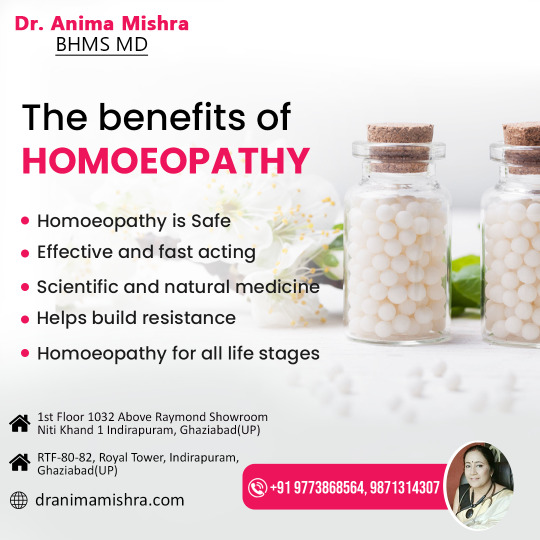
When it comes to the best homeopathy specialist in Indirapuram, Dr. Anima Mishra is the first name that strikes everyone’s mind. She is practicing homeopathy for the last 23 years. With her expertise and experience, she provides the best care and treatment for all kinds of chronic and acute ailments.
0 notes
Text
Dr. Anima Mishra |Best Dermatologist in Indirapuram
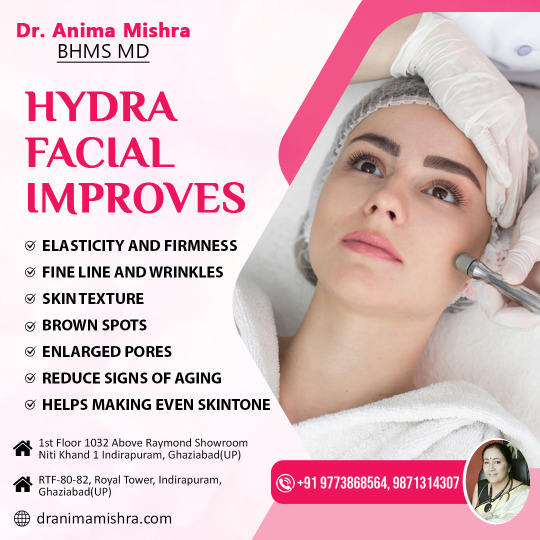
The search for the best homeo clinic in Indirapuram or homeopathy specialist in Indirapuram ends with Dr. Anima Mishra. With her years of experience and matchless expertise, she provides the best treatment for all kinds of ailments. She runs the best homeopathy clinic in Indirapuram.
#Homeopathy Specialist in Indirapuram#Cryolipolysis Clinic in Indirapuram#Tattoo Removal in Indirapuram#Anti Aging Treatment in Indirapauram#Training center for Makeup courses in indirapuram#Training center for beauty courses in indirapuram#Hair Removal Clinic in Indirapuram#Weight Loss Clinic in Indirapauram
0 notes
Text
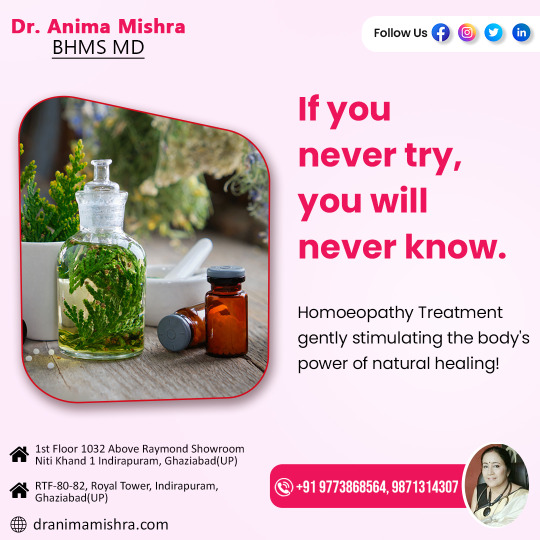
This means that your immune system creates a problem for your body or it attacks a part of your body.
#Cryolipolysis Clinic in Indirapuram#Hair Loss Treatment in Indirapuram#Hair Removal Clinic in Indirapuram#Homeopathy Specialist in Indirapuram#Hydra Facial Clinic in Indirapuram#Laser Hair Removal in Indirapuram#Laser Treatment in Indirapuram
0 notes
Text
https://dranimamishra.com/AboutUs.html
0 notes
Text
Best Implantologist in Indirapuram
Best Implantologist in Indirapuram is an ISO Guaranteed Multi-Speciality Unit set up in the Year 2014 at the core of Indirapuram (Ghaziabad) by Dr. Amit Prakash, in the dream memory of his granddad for giving current Dental, Skin, and Hair Homeopathy administrations while spearheading the idea of one point answers for all the Dental and Healthy skin as need might arise of the local area at truly sensible expense exceptionally for individuals who are not ready to bear the cost of significant expense of corrective treatment.
Our Dental and Skin health management group is devoted to furnishing you the best quality in all parts of Dental and Skin health management inside a cordial and caring climate at entirely sensible/concessional rates.
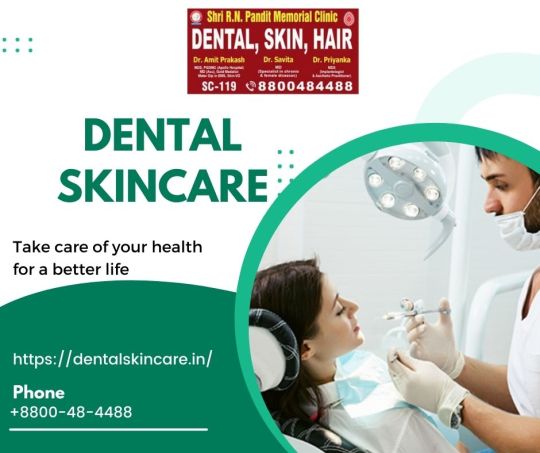
Dental implantology is the process of placing dental implants in the jaw. It basically comes under the category of prosthodontist who has specialization in tooth replacement and restoration. General dental specialists bargain in ordinary dental consideration and counteraction methods while an implantologist explicitly carries out careful inserts. They reestablish and supplant harmed or rotting teeth to work on the mouth's capability through careful techniques like false teeth.
0 notes
Text

When it comes to the best homeopathy specialist in Indirapuram, Dr. Anima Mishra is the first name that strikes everyone’s mind. She is practicing homeopathy for the last 23 years. With her expertise and experience, she provides the best care and treatment for all kinds of chronic and acute ailments.
#Weight Loss Clinic in Indirapauram#Laser Treatment in Indirapuram#Laser Hair Removal in Indirapuram#Hair Loss Treatment in Indirapuram#Best Dermatologist in Indirapuram#Skin Specialist in Indirapuram#Best Skin Specialist in Indirapuram#Hair Removal Clinic in Indirapuram
0 notes
Photo


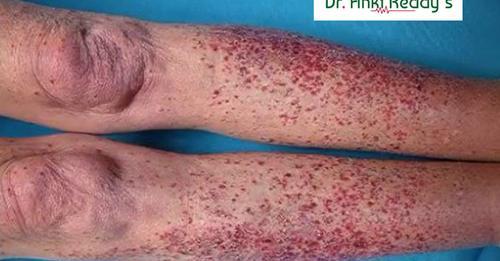
Dr. Ankireddy’s (Sneha Homeopathy Clinic) includes homeopathy as a combination of psychology, communications and medical “Art”. Here the doctors able to get close to people, deeply understand and address their psychological and physical, economical & social problems.
Dr. Ankireddy’s clinic treats Chronic, deep-seated health problems from cold to cancer, an autoimmune disorder with his own approach. Dr. Ankireddy’s (Sneha Homeopathy Clinic is the ocean with Astonishing unbelievable results, here Miracle will happen every day of “Rheumatoid Arthritis, SLE’S, Infertility, Thyroid, Testimonials Before & After”.
Here we provide the Homeopathy Medicine a safe, natural system of medicine that works with your body to restore overall balance – relieving symptoms and promoting long-term good health.
Here we provide Homeopathy remedies that include minimum dose and are gentle, subtle and powerful. They are nonaddictive and safe for all ages from pregnant women and newborns to the elderly. More than 90000 cases and Lakhs of patients benefited from treatment provided by Sneha Homeopathy Clinic.
1 note
·
View note
Link

Homeopathy is basically an alternative medical treatment. In this practice, an extremely dilute amount of certain natural substances mainly extracted from plants, animal and mineral sources are used to treat various ailments. Best homeo clinic in Indirapuram.
#Homeopathy Specialist in Indirapuram#Homeo Clinic in Indirapuram#Best Homeopathy specialist in Indirapuram#Best Homeopathy clinic in Indirapuram#Best homeo clinic in Indirapuram
1 note
·
View note
Text
*Dr. Smita Goel Homeopathy Clinic*
www.thehomeopathyclinic.co.in
A person with short stature, or restricted growth, does not grow as tall as other people of the same gender, age, and ethnicity. The person's height is below the 3rd percentile.
Short stature can be a variant of normal growth, or it may indicate a disorder or condition.
Growth rate is an important indicator of overall health. Children who do not reach the 5th percentile by the age of 5 years are said to be small for gestational age (SGA). A pediatrician will look out for signs of "failure to thrive."
Early intervention can prevent future problems in many cases.
Normally, at 8 years of age, a child's arm span is around the same as their height. If these measurements are out of proportion, this may be a sign of disproportionate short stature (DSS), sometimes known as "dwarfism."
Fast facts on short stature
Here are some key points about short stature. More detail is in the main article.
• Short stature can happen for a wide range of reasons, including having small parents, malnutrition, and genetic conditions such as achondroplasia.
• Proportionate short stature (PSS) is when the person is small, but all the parts are in the usual proportions. In disproportionate short stature (DSS), the limbs may be small compared with the trunk.
• If short stature results from a growth hormone (GH) deficiency, GH treatment can often boost growth.
• Some people may experience long-term medical complications, but intelligence is not usually affected.
Causes
Growth depends on a complex range of factors, including genetic makeup, nutrition, and hormonal influences.
The most common cause of short stature is having parents whose height is below average, but around 5 percent of children with short stature have a medical condition.
Conditions that can underlie short stature include:
• Undernutrition, due to a disease or lack of nutrients
• Hypothyroidism, leading to a lack of growth hormone
• A tumor in the pituitary gland
• Diseases of the lungs, heart, kidneys, liver, or gastrointestinal tract
• Conditions that affect the production of collagen and other proteins
• Some chronic diseases, such as celiac disease and other inflammatory disorders
• Mitochondrial disease, which can affect the body in different ways, including growth
Sometimes, an injury to the head during childhood can lead to reduced growth.
A lack of growth hormone can also lead to delayed or absent sexual development.
Rheumatologic diseases, such as arthritis, are linked to short stature. This may happen because of the disease, or as a result of the glucocorticoid treatment, which can affect the release of growth hormone.
Disproportionate short stature (DSS) usually stems from a genetic mutation that affects the development of bone and cartilage and undermines physical growth.
The parents may not have short stature, but they may pass on a condition that is linked to DSS, such as achondroplasia, mucopolysaccharide disease, and spondyloepiphyseal dysplasia (SED).
Types
There are different types and causes of short stature, or restricted growth, and they will present differently. Because the range of conditions is so broad, restricted growth can be classified in various ways.
One categorization is:
• Variant restricted growth
• Proportionate short stature (PSS)
• Disproportionate short stature (DSS)
Each of these categories includes a number of types and causes of short stature.
Variant restricted growth
Sometimes a person is small but otherwise healthy. This can be referred to as variant restricted growth. It may happen for genetic or hormonal reasons.
If the parents are also small, this can be called familial short stature (FSS). If it stems from a hormonal issue, it is a constitutional delay in growth and adolescence (CDGA).
The limbs and the head develop in proportion with the spine, and the individual is otherwise healthy.
Growth happens throughout the body, so the legs, for example, are in proportion with the spine.
In most cases, the individual's parents are also small, but sometimes small stature happens because the body does not produce enough growth hormone (GH), or the body does not process growth hormone properly. This is known as GH insensitivity. Hypothyrodism can lead to low hormone production.
Growth hormone treatment during childhood may help.
Proportionate short stature (PSS)
Sometimes, overall growth is restricted, but the person's body is in proportion, and the individual has a related health problem. This is known as proportionate short stature (PSS).
If the individual is heavy for their height, this can suggest a hormone problem. The problem could be hypothyroidism, excess glucorticoid production, or too little GH.
A person who is small and their weight is low for their height may be experiencing malnutrition, or they may have a disorder that leads to malabsorption.
Whatever the underlying reason, if it affects overall growth, it may impact development in at least one body system, so treatment is needed.
During adulthood, a person with this type of restricted growth is more likely to experience:
• osteoporosis
• cardiovascular problems
• reduced muscle strength
Rarely, there may be cognitive problems, or problems with thinking. This depends on the cause of the short stature.
Disproportionate short stature (DSS)
Disproportionate short stature (DSS) is linked to a genetic mutation. The parents are usually of average height. As with other types of short stature, a range underlying causes is possible.
An individual with DSS will be small in height, and they will have other unusual physical features. These may be visible at birth, or they may develop in time as the infant develops.
Most individuals will have an average-sized trunk and short limbs, but some people may have a very short trunk and shortened, but disproportionately large limbs. Head size may be disproportionately large.
Intelligence or cognitive abilities are unlikely to be affected unless the person has hydrocephalus, or too much fluid around the brain.
Achondroplasia underlies around 70 percent of cases of DSS. It affects around 1 in 15,000 to 1 in 40,000 people.
Features include:
• an average-sized trunk
• short limbs, especially the upper arms and legs
• short fingers, possibly with a wide space between the middle and ring fingers
• limited mobility in the elbows
• a large head with a prominent forehead and flattened bridge of the nose
• bowed legs
• lordosis, a progressive development of a swayed lower back
• average adult height of 4 feet, or 122 cm
Hypochondroplasia is a mild form of achondroplasia. It may be difficult to differentiate between familial short stature and achondroplasia.
Achondroplasia and hypochondroplasia result from a genetic mutation.
Genetic conditions, such as Turner syndrome, Down syndrome, or Prader Willi syndrome, are also linked to DSS.
Diagnosis
Some types of short stature can be diagnosed at birth. In other cases, routine visits to a pediatrician should reveal any abnormal growth pattern.
The doctor will record the child's head circumference, height, and weight.
If the doctor suspects restricted growth, they will carry out a physical examination, look at the child's medical and family history, and possibly carry out some tests.
These may include:
An x-ray, to assess for problems with bone development
An insulin tolerance test, to check for a deficiency in the growth hormone insulin-like growth factor-1 (IGF-1).
In this test, insulin is injected into a vein, causing blood glucose levels to drop. Normally, this would trigger the pituitary gland to release growth hormone (GH). If GH levels are lower than normal, there may be a GH deficiency.
Other tests include:
• a thyroid-stimulating hormone test, to check for hypothyroidism
• a complete blood count, to test for anemia
• metabolic tests, to assess liver and kidney function
• erythrocyte sedimentation and C-reactive protein tests, to assess for inflammatory bowel disease
• urine tests can check for enzyme deficiency disorders
• tissue transglutinase and immunoglobulin A tests, for celiac disease
• imaging scans, such as an x-ray of the skeleton and the skull or an MRI, can detect problems with the pituitary gland or hypothalamus
• bone marrow or skin biopsies may help confirm conditions associated with short stature
Treatment
Treatment will depend on the cause of the short stature.
If there are signs of malnutrition, the child may need nutritional supplements or treatment for a bowel disorder or other condition that is preventing them from absorbing nutrients.
If growth is restricted or delayed because of a hormonal problem, GH treatment may be necessary.
Pediatric hormone treatment: In children who produce too little GH, a daily injection of hormone treatment may stimulate physical growth later in life. Medications, such as somatropin, may eventually add 4 inches, or 10 centimeters, to adult height.
Adult hormone treatment
: Treatment for adults can help protect against complications, for example, cardiovascular disease and low bone mineral density.
Somatropin, also known as recombinant GH, might be recommended for people who:
• have a severe growth hormone deficiency
• experience impaired quality of life
• are already receiving treatment for another pituitary hormone deficiency
Adult patients generally self-administer daily with an injection.
Adverse effects of somatropin include headache, muscle pain, edema, or fluid retention, problems with eyesight, joint pain, vomiting, and nausea.
The patient may receive treatment to control chronic conditions, such as heart disease, lung disease, and arthritis.
Treatment for DSS
As DSS often stems from a genetic disorder, treatment focuses mainly on the complications.
Some patients with very short legs may undergo leg lengthening. The leg bone is broken and then fixed into a special frame. The frame is adjusted daily to lengthen the bone.
This does not always work, it takes a long time, and there is a risk of complications, including:
• pain
• the bone forming badly or at an inappropriate rate
• infection
• deep vein thrombosis (DVT), a blood clot in a vein
Other possible surgical treatments include:
• use of growth plates, where metal staples are inserted into the ends of long bones where growth takes place, to help bones grow in the right direction
• inserting staples or rods to help the spine form the right shape
• increasing the size of the opening in the bones of the spine to reduce pressure on the spinal cord
Regular monitoring can reduce the risk of complications.
Complications
A person with DSS may experience a number of complications.
These include:
• arthritis later in life
• delayed mobility development
• dental problems
• bowed legs
• hearing problems and otitis media
• hydrocephalus, or too much fluid in the brain cavities
• hunching of the back
• limb problems
• swaying of the back
• narrowing of the channel in the lower spine during adulthood and other spine problem
• sleep apnea
• weight gain
• speech and language problems
Individuals with proportionate short stature (PSS) may have poorly developed organs and pregnancy complications, such as respiratory problems. Delivery will normally be by cesarean section.
Outlook
Most people with short stature will have a normal life expectancy, and 90 percent of children who are small for their age at 2 years will "catch up" by adulthood.
The 10 percent who do not catch up are likely to have a condition such as fetal alcohol, Prader-Willi, or Down syndrome.
A person with achondroplasia can also expect a normal lifespan.
However, some serious conditions that are linked to some cases of short stature can be fatal.

#greater noida#best homeo clinic in indirapuram#ghaziabad#homeopathy clinics#homeopathy doctor#homeopathy for ibs#best skin doctor in ghaziabad#homeopathy#homeopathy cold treatment in indirapuram#homeopathy medicine#best homeopathy clinic in indirapuram#best homeopathy doctor#homeopathy skin allergies treatment in indirapuram#homeopathy skin allergies treatment in noida#homeopathy specialist in indirapuram#homeopathy treatment#laser treatment in indirapuram#skin specialist in indirapuram#indirapuram#ghaziabad latest news#ghaziabadnews#ayurvedic doctor in ghaziabad#wave city ghaziabad#best schools in ghaziabad#child doctor in noida#child specialist in noida#noida news#nursery school in greater noida#noida#delhifood
2 notes
·
View notes
Text
Dr. Anima Mishra | Can homeopathy help with asthma?
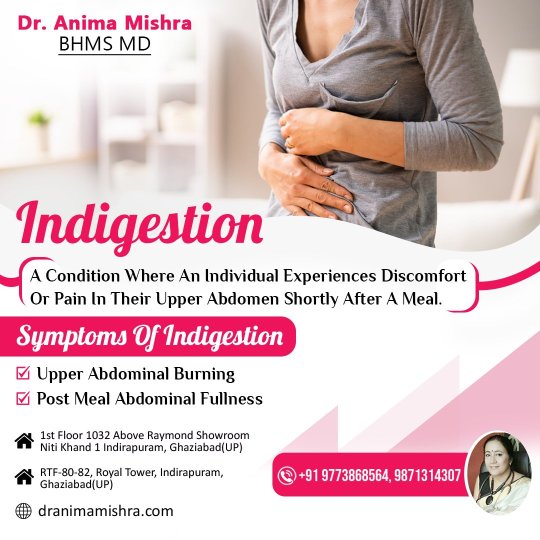
Asthma, homoeopathic treatment is effective for managing symptoms when a person is under the care of a qualified health practitioner.
#Best Homeopathy Clinic in Indirapuram#Homeopathy Specialist in Indirapuram#Cryolipolysis Clinic in Indirapuram#Tattoo Removal in Indirapuram#Anti Aging Treatment in Indirapauram#Training center for Makeup courses in indirapuram#Training center for beauty courses in indirapuram#Hair Removal Clinic in Indirapuram#Weight Loss Clinic in Indirapauram#Laser Treatment in Indirapuram#Laser Hair Removal in Indirapuram#Hair Loss Treatment in Indirapuram#Best Dermatologist in Indirapuram
2 notes
·
View notes
Text
The Best Dermatologist in Ghaziabad - Dr. Anima Mishra
Best Dermatologist in Ghaziabad, where the urban lifestyle often takes a toll on our skin, finding the right dermatologist becomes imperative. Among the sea of skincare specialists, one name stands out - Dr. Anima Mishra. With her exceptional expertise, extensive experience, and a genuine passion for enhancing the beauty and health of her patients' skin, Dr. Anima Mishra has earned the reputation of being the best dermatologist in Ghaziabad. In this article, we'll delve into what makes her the go-to choice for skin care needs and explore her top services.
1. Best Dermatologist in Ghaziabad
Dr. Anima Mishra is a highly qualified Best Dermatologist in Ghaziabad with an illustrious educational background. She holds a Doctor of Medicine (MD) in Dermatology, Venereology, and Leprology, along with several certifications in cosmetic dermatology and laser procedures. Her extensive knowledge and training make her an expert in diagnosing and treating a wide range of skin conditions, from acne and eczema to more complex dermatological issues.
2. Personalized Approach
What truly sets Dr. Anima Mishra apart is her commitment to providing personalized care. She understands that every patient's skin is unique and requires tailored solutions. During the initial consultation, Dr. Mishra takes the time to listen to her patients' concerns, conduct a thorough examination, and develop a customized treatment plan that addresses their specific needs and goals. This patient-centric approach ensures that each individual receives the best possible care for their skin issues.
3. Comprehensive Services
Dr. Anima Mishra offers a wide range of dermatological services to cater to the diverse needs of her patients. Some of her key services include:
- Acne Treatment: Dr. Mishra employs advanced techniques to effectively treat and manage acne, helping her patients achieve clearer, healthier skin.
- Anti-Aging Solutions: With the latest in anti-aging treatments, including Botox and dermal fillers, she helps patients rejuvenate their appearance and reduce the signs of aging.
- Skin Rejuvenation: Dr. Mishra provides innovative skin rejuvenation treatments, such as chemical peels and laser therapy, to revitalize and enhance the skin's texture and tone.
- Hair Restoration: Her expertise extends to hair restoration procedures, offering solutions for hair loss and thinning hair.
- Dermatological Surgery: When necessary, Dr. Anima Mishra performs dermatological surgeries with precision and care to address skin conditions like cysts and skin cancer.
4. State-of-the-Art Technology
Dr. Mishra's clinic is equipped with state-of-the-art technology and cutting-edge equipment. This ensures that her patients receive the latest and most effective treatments available in the field of dermatology. Whether it's laser therapy for skin resurfacing or advanced diagnostic tools for accurate assessments, Dr. Mishra spares no effort in providing her patients with the best possible care.
5. Commitment to Safety
Safety is of paramount importance in all of Dr. Anima Mishra's procedures. She follows strict hygiene and sterilization protocols to ensure that her clinic maintains the highest standards of safety and cleanliness. Moreover, all treatments are performed by trained professionals under her supervision, giving patients peace of mind regarding their well-being throughout their skincare journey.
Conclusion
In the bustling metropolis of Ghaziabad, Dr. Anima Mishra shines as the best dermatologist, offering a comprehensive range of services, personalized care, and a commitment to safety and excellence. Her dedication to helping patients achieve radiant and healthy skin has earned her a loyal following and a well-deserved reputation in the field of dermatology. If you're seeking expert skincare solutions in Ghaziabad, look no further than Dr. Anima Mishra. Your journey to flawless skin begins here.
Click Here to know More Information About Dr. Anima Mishra
Asthma treatment clinic in Indirapuram
Best Skin Specialist in Indirapuram
Best Dermatologist in Indirapuram
Best Homeopathy Clinic in Indirapuram
#Best Homeopathy Clinic in Indirapuram#Homeo Clinic in Indirapuram#Best Dermatologist in Indirapuram#Laser Treatment in Indirapuram#Hair Loss Treatment in Indirapuram#Weight Loss Clinic in Indirapuram#Homeopathy Specialist in Indirapuram#Best Homeopathic Specialist in Indirapuram#Best Dermatologist in Ghaziabad#Cryolipolysis Clinic in Indirapuram#Asthma homeopathy treatment in Indirapuram#Anti Aging Treatment in Indirapauram#Permanent Hair Removal Clinic in Indirapuram#Hydra Facial Clinic in Indirapuram
0 notes
Text
DO’S AND DON’TS AFTER LASER HAIR REMOVAL
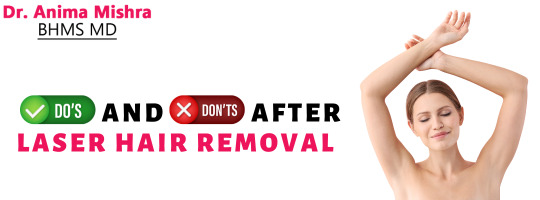
Laser Hair Removal is a method to permanently remove unwanted hair from your body. Unlike temporary hair removal methods waxing or hair removing cream, this method is painless, permanent, and very cost-effective in the long run. The process of reducing hair through laser takes multiple sessions for the hair growth to completely stop.
For treatment to be successful and effective with minimal potential adverse effects possible, you must follow the aftercare routine. This would also include certain steps that one should take care of after each session. Some of the tips for aftercare would be:
What to do after your treatment?
You should apply an ice pack to the treated area to reduce pain, discomfort, or irritation.
You should apply aloe vera gel or calming creams for 3 days after the treatment.
You should wear loose clothes to avoid friction on the treated area for 48 hours.
You should keep the treated area clean and dry for 48 hours.
You should drink plenty of water.
You should use at least SPF 50 sunscreen with Zinc for at least 2 weeks.
What to avoid after treatment?
The sun and its harmful UVA and UVB rays may irritate the treated area. So it is advised, to avoid the sun for at least a week after each session. Also this is to minimize the darkening of the skin (hyperpigmentation).
The laser treatment works on the principle of using heat to destroy hair follicles. Avoid heat treatments such as spas, steam rooms, and saunas for 7 days. Heat would lead to irritation of the treated area.
Avoid excessive scrubbing/ scratching or applying pressure or shaving to the treated area for 4-5 days. This is to allow the treated skin to recover and to prevent any infection as this can cause scarring.
Avoid exercising for at least 48 hours. It is advised not to indulge in any strenuous activities, raising the body temperature can also affect you treated skin.
Avoid using harsh chemicals like bleach on your skin, especially the face, can irritate the treated area. Wait for a minimum of 24 hours before using any makeup after each session. Avoid waxing, tweezing, and threading for the complete duration of the treatment course.
Looking for Laser Hair Removal in Delhi NCR? Get the Painless and Scar less service by certified Dermatologist and Homeopath Dr. Anima Mishra. The Hair Removal Clinic in Indirapuram is a complete and all-inclusive advanced skin clinic fortified with the newest and modern equipment.
Source :- https://dranimamishra.com/blog/dos-and-donts-after-laser-hair-removal/
1 note
·
View note
Text
Dr. Anima Mishra | Dermatologist in Indirapuram
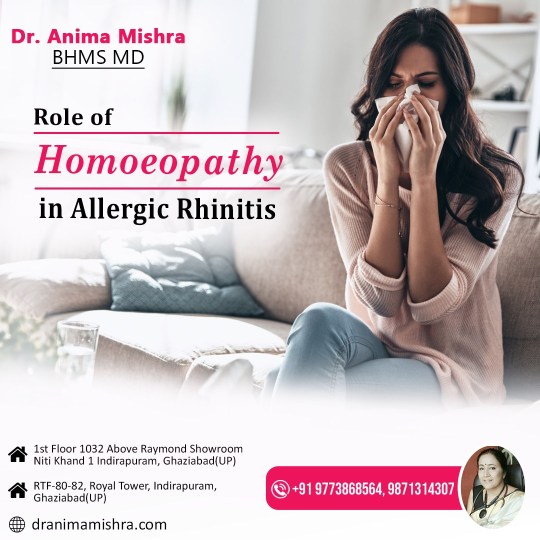
When it comes to the best homeopathy specialist in Indirapuram, Dr. Anima Mishra is the first name that strikes everyone’s mind. She is practicing homeopathy for the last 23 years. With her expertise and experience, she provides the best care and treatment for all kinds of chronic and acute ailments.
#Homeopathy Specialist in Indirapuram#Cryolipolysis Clinic in Indirapuram#Tattoo Removal in Indirapuram#Anti Aging Treatment in Indirapauram#Training center for Makeup courses in indirapuram#Training center for beauty courses in indirapuram#Hair Removal Clinic in Indirapuram#Weight Loss Clinic in Indirapauram
0 notes